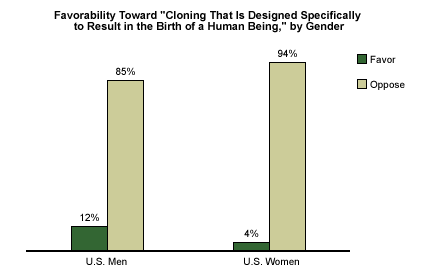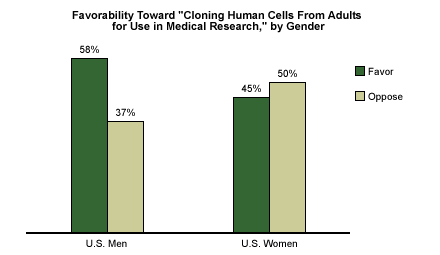Americans adamantly oppose the idea of cloning human beings, although a slim majority favor cloning human cells for medical research (see "‘Cloning' Humans Is a Turn Off to Most Americans" in Related Items). A legislative bill to ban all forms of human cloning recently stalled in the Senate, and the legal fate of this contentious issue is more uncertain than ever.
It is no surprise that some of the strongest supporters of a cloning ban include prominent Republicans (including President Bush), pro-life advocates and Catholics. But recent Gallup polling in both the United States and Canada indicates that women are significantly more opposed to cloning than men are.
Cloning Humans
According to a May 2002 Gallup Poll of U.S. adults*, both men and women oppose "cloning that is designed specifically to result in the birth of a human being," but women are more overwhelmingly opposed than men are. Ninety-four percent of women oppose it, compared to 85% of men. On the other hand, 12% of men say they support this type of cloning, compared to 4% of women.

Results from a similar Gallup Poll question asked in Canada in January 2002** indicate a similar gender gap. Canadian respondents were asked, "If scientists were able to clone a human being, would you approve or disapprove of this?" Eighteen percent of men approved and 77% of men disapproved. In contrast, only 10% of women said they approved of human cloning and 88% disapproved.
Cloning Human Cells
Many opponents of an all-out cloning ban, including celebrity activists Michael J. Fox and Christopher Reeve, feel that the cloning of human cells for medical purposes should be permitted. Human stem cells are already being used extensively for medical research and could possibly lead to treatments or cures for such diseases and conditions as diabetes, Parkinson's disease, multiple sclerosis, spinal cord injury and stroke.
Americans are more evenly divided on the issue of cloning adult human cells for medical research than they are on the issue of cloning humans. But once again, men are significantly more likely to favor this type of cloning than women are. When asked if they favor or oppose "cloning of human cells from adults for use in medical research," a majority of men (58%) said they favor it, compared to just (45%) of women. In fact, a majority of women (50%) oppose this type of cloning.

Although the context of the question was quite different, Canadians were also asked about their views on cloning adult human cells. The question was: "As you are probably aware, it is also possible to only clone a certain number of cells rather than cloning an entire person. Would you allow a certain number of your own cells to be cloned if it were the only way to treat yourself medically?" Once again, men were more likely to answer affirmatively than women -- 70% of men said they would allow their own cells to be cloned, compared to 59% of women.
Key Points
At this point, one can only speculate about why the issue of cloning may be more likely to alarm North American women more than it does men. Certainly it seems reasonable to surmise that women are more attuned to the natural biology of the reproductive process, and are therefore more wary of anything potentially disruptive of that process. The idea highlights a dimension of the cloning controversy that has perhaps been overshadowed by all the pontification about morality: regardless of the laws surrounding cloning techniques, their use will have a psychological and sociological impact that will affect some populations more than others. Researchers and policy-makers alike should do their best to understand such potential effects as the march of science continues.
*Results are based on telephone interviews with 1,012 U.S. adults, aged 18 and older, conducted May 6-9, 2002. For results based on the total sample, one can say with 95% confidence that the maximum margin of sampling error is ±3%.
**Results are based on telephone interviews with 1,000 Canadian adults, aged 18 and older, conducted Jan. 15-20, 2002. For results based on the total sample, one can say with 95% confidence that the maximum margin of sampling error is ±3%.